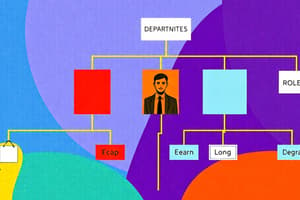Podcast
Questions and Answers
What is a job?
What is a job?
- A specific role you do for money (correct)
- A responsibility or obligation you're expected to perform
- A broad category of jobs
- Any activity you do to accomplish something
What is an occupation?
What is an occupation?
A broad category of jobs.
What is a profession?
What is a profession?
A job that requires special education and training.
A skill is something that can only be inherited.
A skill is something that can only be inherited.
What is an experience?
What is an experience?
What does it mean to manage something?
What does it mean to manage something?
What does it mean to operate a machine?
What does it mean to operate a machine?
A __________ is a responsibility or obligation expected to perform as part of a job or role.
A __________ is a responsibility or obligation expected to perform as part of a job or role.
What is the meaning of a goal?
What is the meaning of a goal?
Success refers to the process of learning.
Success refers to the process of learning.
What does an employer do?
What does an employer do?
What is the role of an employee?
What is the role of an employee?
Flashcards are hidden until you start studying
Study Notes
Job Related Terms
- Job: A specific role performed for monetary compensation, e.g., cashier or teacher.
- Occupation: A broad category encompassing various jobs, e.g., education includes teachers and principals.
- Work: Any task or activity aimed at accomplishment, can be paid or unpaid, e.g., writing a report or cooking dinner.
- Profession: A job requiring specialized education and training, e.g., doctors, lawyers, architects.
Management Terms
- Manage: To organize and oversee something, focusing on planning and coordination, e.g., managing a project.
- Run: To be in charge and control daily operations, e.g., running a business.
- Operate: To use or control machinery or systems, e.g., operating a computer or equipment.
- Undertake: To start and commit to a task or project, e.g., undertaking a new initiative.
Skills and Qualifications
- Skill: An ability developed through practice, e.g., coding or public speaking.
- Quality: A personal characteristic or trait, e.g., creativity or punctuality.
- Qualification: An official record proving knowledge or skills, e.g., a diploma or certification.
- Experience: Knowledge and skills gained over time through various activities, e.g., volunteer work or internships.
Task and Responsibility Terms
- Task: A specific piece of work or activity that needs completion, e.g., writing a report.
- Course: A structured program of lessons on a particular subject, e.g., a language or cooking course.
- Duty: A responsibility typically associated with a job, e.g., a teacher grading papers.
Group Terms
- Party: A temporary group formed for a specific purpose, e.g., a search party or a birthday celebration.
- Crew: A team working together on a project, often involving manual or technical work, e.g., a film crew.
- Staff: Regular employees of an organization responsible for ongoing operations, e.g., restaurant staff.
Goals and Aspirations
- Aim: A direction or purpose to achieve, e.g., aiming to become a doctor.
- Goal: A specific, measurable outcome you want to reach, e.g., running a marathon next year.
- Intention: A plan or purpose to act, often without a specific timeframe, e.g., starting to exercise more.
- Challenge: A difficult task testing abilities, e.g., learning a new language.
- Success: The achievement of a goal or aim, e.g., succeeding in business.
- Ambition: A strong desire for significant achievement requiring hard work, e.g., becoming a CEO.
Achievement and Management
- Achieve: To successfully reach a desired goal through effort, e.g., achieving a dream profession.
- Fulfil: To complete or accomplish a duty or promise, e.g., fulfilling a commitment.
- Cope: To manage or endure a difficult situation, e.g., coping with stress.
- Deal: To take action or handle a situation, e.g., dealing with workplace issues.
- Face: To confront challenges directly, e.g., facing difficult realities.
- Succeed: To accomplish a desired goal or outcome, e.g., succeeding in improving a company.
Employee Relationships
- Employer: An individual or organization that hires and compensates employees, e.g., a CEO.
- Employee: A person working for an employer in exchange for wages, e.g., a marketing specialist.
- Colleague: A co-worker in the same profession or organization, e.g., a coworker in a department.
- Assistant: A person helping or supporting others in their work, e.g., a personal assistant.
- Clerk: An individual performing routine tasks in an office or store, e.g., a bank clerk.
- Officer: A person in a position of authority, often with specific responsibilities, e.g., a police officer.
- Attendant: A person providing services, often in customer-facing roles, e.g., a hotel attendant.
Studying That Suits You
Use AI to generate personalized quizzes and flashcards to suit your learning preferences.




